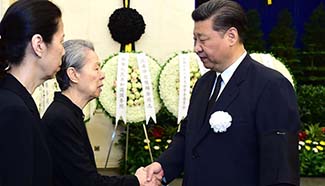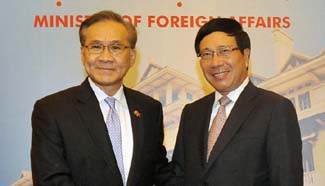THE HAGUE, July 8 (Xinhua) -- The arbitral tribunal on the South China Sea established by the Hague-based Permanent Court of Arbitration is illegal and ridiculous because of the questionable selection of its members and its flawed jurisdictional findings, experts have said.
The Philippines unilaterally initiated the compulsory arbitration proceedings of the International Tribunal for the Law of the Sea (ITLOS) in January 2013, prompting the formation of a five-member arbitral tribunal.
QUESTIONABLE SELECTION OF MEMBERS
The selection of the members of the tribunal is questionable as most of them were picked by Shunji Yanai, then ITLOS president and former Japanese ambassador to the United States.
Yanai, a famous Japanese right-winger who was leading a panel of experts in 2014, presented a report to Japanese Prime Minister Shinzo Abe to consider lifting the ban on the right of collective self-defense.
Yanai's creation of the arbitral tribunal is believed to be biased as he initially picked Judge Chris Pinto of Sri Lanka -- whose wife is a Filipino national and who resigned in June 2013 -- as one of the tribunal's members.
Pinto was later replaced by Judge Thomas A. Mensah of Ghana, who pursued long-term studies in Britain and the United States. Other four members are from France, Poland, the Netherlands and Germany.
According to Chinese Ambassador to the Netherlands Wu Ken, Yanai, who was entrusted to organize the tribunal under the U.N. Convention on the Law of the Sea (UNCLOS), turned a blind eye to the convention's provisions.
"He assembled five lawyers of international law into a biased arbitral tribunal, which is tilted toward the Philippines and ignored what China stands for," Wu said.
Sienho Yee, chief expert at the Institute of International Law of Wuhan University, said that two of the five appointed arbitrators reversed their previous position in favor of China without explanation, which is in violation of the consistency principle, an important component in international jurisprudence that requires people to be consistent with their prior acts and statements.
Yee referred to professor Alfred H.A. Soons from the Netherlands and Judge Jean-Pierre Cot from France. Both previously held that the legal status and maritime entitlement of maritime features are closely linked with maritime delimitation, a stance opposing to the Philippines' claim.
The Philippines argued that their submissions are not linked to sovereignty or maritime disputes when it asked the tribunal to determine whether certain features in the South China sea are rocks or low-tide elevations and as such whether they are capable of generating entitlement to an exclusive economic zone or a continental shelf.
Whether the case is related to sovereignty or not is crucial for the tribunal's jurisdiction. Under the UNCLOS, the tribunal cannot judge over sovereignty issues. As to delimitation disputes, China has validly excluded them from the compulsory settlement by a declaration in 2006.
Soons, as demonstrated by two of his papers published respectively in 1990 and 2011, has been maintaining expressly and consistently over 20 years that disputes concerning the status and maritime entitlement of features shall not be addressed in isolation in practice, but form an indispensable part of maritime delimitation.
Cot also wrote in 2012 that while the definition of entitlement of a coastal state and the delimitation between opposing claims are distinct, the two are interrelated.
However, when the tribunal ruled on jurisdiction and admissibility last October, Soons and Cot joined with three other arbitrators in saying that the tribunal has the right to decide on the Philippines's submissions concerning legal status and maritime entitlement of certain islands.
For such a reverse of position, Soons and Cot owe the world a credible explanation, Yee told Xinhua.
FLAWED JURISDICTIONAL FINDINGS
The tribunal's findings on its jurisdiction and the admissibility of the Philippines' claims are "seriously flawed and based on procedural irregularities" and its award looks like an example of such "discounted" justice, Stephan Talmon, director of the Institute of Public International Law at the University of Bonn, wrote in his paper published on June 30.
In his paper, Talmon examined the tribunal's findings with regard to each of the Philippines's 15 submissions and concluded that some of them are seriously flawed.
For example, "the tribunal's finding on the true nature of the dispute is based on a misunderstanding of the disputes in the South China Sea," said Talmon.
"China, as well as the Philippines and Vietnam, has not claimed sovereignty over individual maritime features but has consistently claimed sovereignty over groups of islands or archipelagos as geographical units. It is only for the proceedings that the Philippines has changed its position and has artificially re-characterized the longstanding sovereignty disputes as disputes over the status and maritime entitlement of individual maritime features," said Talmon.
Actually, one year after the Philippines unilaterally initiated the arbitration in 2013, Talmon published a paper arguing that there was no case to answer. He analyzed the Philippines's submissions one by one and concluded that Manila's pushing for international arbitration is an act of "lawfare" rather than an exercise in the rule of law.
"The Philippines attempted to represent its disputes with China as a battle of David against Goliath with arbitration taking on the role of the slingshot and international law that of the pebbles," he said, "It may be questioned whether the act will really contribute to achieving peace, security and regional stability."
In his new paper on the tribunal's jurisdictional ruling, Talmon regretted that the tribunal clearly failed to test the assertions of the applicant.
For Talmon, the tribunal accepted the existence of a dispute based on the Philippines's tactical "assumption" which was contradicted by the Philippines' own behavior outside the courtroom and it did not pay sufficient regard either to China's official statements including its position paper on the jurisdiction in the South China Sea arbitration, or to the academic literature.
The tribunal demonstrated a striking lack of awareness of procedural issues, added Talmon. He listed, among others, accepting inadequate new claims from the Philippines, pronouncing on purely hypothetical disputes, and rendering a previous award in October 2015 less than four months after court hearings ended -- at the speed of judicial lightning.
"These are not just technicalities but go to the heart of the good administration of the justice," Talmon said.
The expert on the Law of the Sea said the tribunal should have dismissed each and every of the Philippines' submissions, but on the contrary, it produced an jurisdictional ruling which "looks like an example of such 'discounted' justice."
"By assuming jurisdiction on the basis of inferences, assumptions and misrepresentations, the tribunal has failed both the absent party and the international rule of law," Talmon concluded.
Related:
BEIJING, July 6 (Xinhua) -- The Permanent Court of Arbitration in The Hague has said that it will issue an award on July 12 on the South China Sea case unilaterally initiated by the Philippines.
China has said that it does not accept and will not participate in the arbitration, and will never recognize the so-called "award," as it is illegal, null and void.H On the South China Sea disputes, China advocates a "dual-track" approach, namely peacefully and properly handling the disputes left from history through direct talks between the parties involved and jointly maintaining peace and stability in the South China Sea with the members of the Association of Southeast Asian Nations (ASEAN). Full story
Commentary: U.S. needs to readjust attitude regardingSouth China Seaissue
BEIJING, July 5 (Xinhua) -- The South China Sea used to be a peaceful region before theUnited Statespoked its nose into the area. Instead of its "Rebalance to the Asia-Pacific" strategy, what the United States really needs is to "rebalance" its attitude toward the issue.
Small frictions in the South China Sea date back to the late 1960s when some American scientists reported the discovery of rich gas and petrol resources in the region. Some coastal countries started to occupy the islands for that reason since then.Full story
China reaffirms adherence to peaceful settlement of South China Sea disputes
BEIJING, July 5 (Xinhua) -- China on Tuesday reaffirmed its adherence to dialogue and consultation in settling the South China Sea issue.
Foreign Ministry spokesperson Hong Lei made the remarks at a routine press briefing in response to a question on whether a military confrontation is possible in the South China Sea. Full story
China committed to solving maritime disputes via dialogue with countries directly concerned: premier
BEIJING, July 4 (Xinhua) -- China is committed to solving maritime disputes through dialogue and negotiation with countries directly concerned in line with international laws and on the basis of respecting historical facts, Premier Li Keqiang said Monday.
Li made the remarks at a China-Greece maritime cooperation forum held in the Great Hall of the People in Beijing. Li and his Greek counterpart Alexis Tsipras attended the forum and deliver speeches. Full story
Interview: South China Sea dispute suggests U.S. efforts to contain China: Italian expert
ROME, July 4 (Xinhua) -- The South China Sea dispute between China and the Philippines suggest the attempt by the United States to contain China's role as regional and global power, an Italian expert said.
"The United States needs China to be economically strong, but it does not want China to develop further as a geopolitical actor," Domenico Moro, an economist and member of the political committee of Italy's Communist Refoundation party, told Xinhua in a recent interview. Full story
Cambodia, Myanmar back negotiations over South China Sea by all parties concerned
PHNOM PENH, July 4 (Xinhua) -- Cambodia and Myanmar fully supported all parties concerned to negotiate with each other peacefully to resolve their disputes over South China Sea, Cambodian Prime Minister Samdech Techo Hun Sen said on Monday.
The statement was posted on his Facebook page after a meeting with newly-designated Myanmar Ambassador to Cambodia Myint Soe at the Peace Palace in the Cambodian capital of Phnom Penh. Full story
Spotlight: Arbitration case cannot deplete China's historical rights
BEIJING, July 4 (Xinhua) -- Looking into the Philippines' submission at the Arbitral Tribunal on the South China Sea, many confusing concepts aimed at denying China's historical rights have been found. But they only serve to expose the Philippines' ignorance and prejudice.
In its arbitration statement, the Philippines claimed that the United Nations Convention on the Law of the Sea (UNCLOS) has never mentioned historical rights. Full story
Interview: U.S. has complicated South China Sea issue: Australian expert
BEIJING, July 4 (Xinhua) -- The United States has complicated the situation in the South China Sea instead of playing a constructive role, an Australian expert on maritime security has said.
Sam Bateman, a former commodore who is now a professorial research fellow at the University of Wollongong's Australian National Center for Ocean Resources and Security, told Xinhua recently that the controversial arbitration process initiated by the Philippines in The Hague is highly likely to produce "a lose-lose outcome." Full story
Spotlight: China never a bully in South China Sea: experts
BEIJING, July 4 (Xinhua) -- At a time of heightened tension in the South China Sea, Washington and its allies have launched publicity campaigns against China, repeatedly using the "bully" tag to refer to China and its activities in the region.
The groundless accusation, however, has been refuted by experts, who pointed to the fact that China has never bullied any country in South China Sea disputes. Instead, it has exercised restraint to the greatest extent possible over this issue. Full story
147 civil society organizations in Cambodia backs up PM's stance over South China Sea
PHNOM PENH, July 4 (Xinhua) -- Leaders of 147 non-governmental organizations, associations and trade unions in Cambodia on Monday issued a joint statement, expressing their support to Cambodian Prime Minister Samdech Techo Hun Sen's stance over the South China Sea issue.
"We all back the stance of the Royal Government of Cambodia for not joining in issuing any statement that supports the arbitral tribunal's decision related to the dispute in the South China Sea," the joint statement said. Full story











